
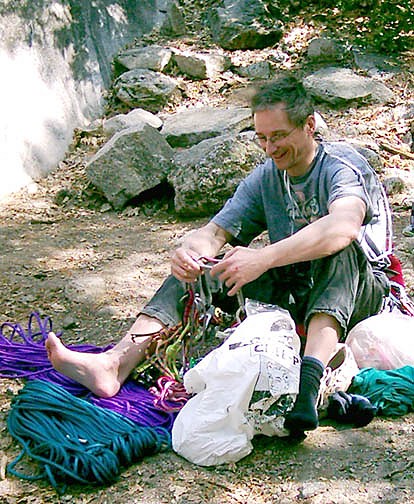
Training - Why Bother?
"It is common practice in training articles to establish the author's credentials from the outset. Not wishing to challenge tradition I can confidently state that as there is no start to my talents and qualifications as a coach, scientist and physiologist it follows that there can be no end to them either. In addition I have never knowingly climbed a cutting edge route and furthermore have always struggled to put the theory of training into practice mainly because I lack discipline and hate it so much." Simon Lee 2008
Training:
As an expert on avoiding and loathing training the question of 'how to train' is to me overshadowed by the far more important question of 'why bother in the first place'. Most of us train because we do not have unlimited time and/or access to rock. We train to either stay in shape or improve for when we are allowed to go climbing. If you have almost unlimited time, motivation and access to rock like Chris Sharma, then the 'Climbing' will become the 'Training' in which case, as is often said, the best training for climbing is climbing (to a point). This also works at the other end of the spectrum. For the beginner; climbing, climbing and a bit more climbing (even on indoor walls) rather than specific training will also reap the most reward (to a point). But inevitably we all, perhaps even Chris Sharma as well, experience diminishing returns and a plateau where some form of training is required to improve if improvement is your goal - which is a big IF.
Improver or Maintainer?
Establishing honestly whether your training revolves around 'Improving' or 'Staying in Shape' is vital to avoid anguish, disappointment and guilt. A vague yearning to improve is unlikely to be enough and you will inevitably end up disappointing yourself, albeit perhaps in a similarly vague and wistful fashion. Being willing to make real sacrifices which risk enjoyability, climbing ability or even marital stability is the kind of stuff that is required to improve – if anyone doubts this then watch 'Rocky' or even '8 Mile' for evidence. However, 'just' staying in shape can be challenging enough but improvement is a real challenge, assuming you are already past that glorious phase of exponential improvement as a beginner.
Both classes of climber, I imagine hearing you say, will no doubt want to get the best out of the time they allocate to training – but do they actually achieve that? Some types of training are more hateful than others. Busting a gut in solitude with a stopwatch on a systems board might be a highly effective method of training, but for those seeking to Maintain rather than Improve it is not worth the effort or the isolation compared to the alternative of a convivial evening spent with mates leading a few routes down the local climbing wall. In general, aspiring and perspiring Improvers are more likely to feel activities like this are a sacrifice worth making, whereas Maintainers,quite understandably, won't.
Before you Improvers start looking down your chiselled pectorals at Maintainers stop and think what an unhinged activity hardcore training is. If you hadn't noticed, you exist in a godless universe where nothing lasts or has meaning. So really, what is the point? Existential truisms aside, improvement doesn't even mean you will have a more enjoyable time with your climbing. If you are challenged outside and enjoy climbing for its own sake, experiencing the challenge on a harder route won't, of itself, be more enjoyable. For example, the relative challenge for a Fr6B climber at their limit on a 6B+ will be no different to a Fr8B climber on an 8B+. The 8B+ climber does have some advantages - harder routes tend to be more sensational and he/she will have a wider choice of routes within their ability at a crag. However, I think typically the driving motivation of Improvers is to climb harder for reasons other than choice or quality. More likely they want to climb routes or grades that inspire them or to satisfy some form of social inadequacy due to being bottle-fed from birth. Maintainers on the other hand might not be the best climbers but they may have more chance of avoiding divorce and raising children that love them, than self-centred, egotistical Improvers.
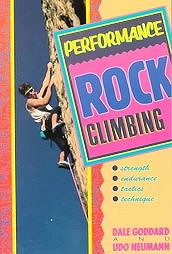
Another issue with respect to return on your training investment (Footnote 1) is that dedicated training is more useful for sport climbers than trad climbers (Footnote 2). For most trad climbers training is less important in converting to higher grades than sport climbing as for most, the main thing holding back pushing trad grades is confidence, desire and 'go for it' rather than physical shape. Physical training might only mean that you use the extra strength to hang around putting more gear in before failing than before, rather than using it to succeed on harder routes. That's not say that as a trad climber you wont benefit at all , just not as much, unless it is genuinely, physical ability that is holding you back. In my view this is rarely the case unless you happen to be a technically talented but weedy climber with no dependants in the grip of a death-wish.
Lest we forget, physical condition, strength, stamina etc. are only one part of being a good climber. The whole area of technique is at least equally important - even for steep routes. Technique isn't just good footwork. It covers a whole gamut of experience such as reading the sequence of moves, effective use of the handholds, discovering rests, body positioning, timing and pace and almost certainly much more. This is why bouldering is doubly useful as training, both for learning all the movement related stuff as well as getting a honed back – although the current vogue for climbing on blobs will not prepare you well for clinging to the walls of the Cromlech or Malham.
Whilst I have alluded to obsessive compulsive personality disorders being useful when it comes to applying yourself to training it can be your undoing as well. Some people become so wrapped up in achieving 1-2-9 they forget what weekends are for, and going outdoors seems like too much effort. The training has become the goal and then it ain't training any more. There have always been strong climbers who never approach their potential outside on routes, but never more so than today.
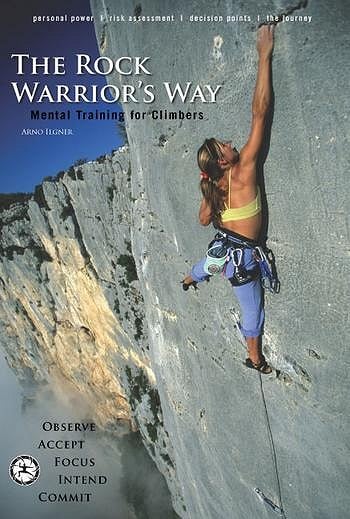
Now we have established that you are either the type of mildly disturbed individual who wants to stay in shape or the deeply disturbed individual who wants to improve then we can move on to the next step – HOW do you go about Training ? Training is unfortunately a tediously complicated subject that defies simplification and it is easy to get bogged down by it all. There are so many variables that it is hard to know where to begin with training. Whilst it might be easier to copy what your mate who climbs one grade harder does, this is almost certainly the wrong way to go (although having seen Malcolm Smith smoke roll-ups yesterday I am now convinced this has to be a beneficial training habit). Far, far better is to strive to understand training principles and techniques and then customise them to suit your own climbing level, aspirations and the time and training resources available to you. Easier said than done.
My recommended starting point is to read and re-read Dave MacLeod's most excellent Rough Guide to Training (Don't forget to keep clicking next page). From here you might browse the extensive free on-line articles which are linked here: LINK. The two published books I am familiar with are also both excellent. Performance Rock Climbing by Goddard and Neumann was a revelation when it came out in 1993 and remains relevant today managing to strike a balance between being accessible, authoritative and insightful. More recently The Self Coached Climber by Hague and Hunter is (much) more of the same but is overall a more serious and intimidating tome. If this all seems too much like hard work then get a coach.
[Editors note - Other titles are available including The Rock Warriors Way - right]
In conclusion I hope you have drawn some useful conclusions from the above. This will save me any summarising and also provides a fitting conclusion to this article that is dedicated to mainly doing your own research and also knowing yourself a bit as well. See you on the Walls and Training Forum.
- (1) The return on your training investment can go up or down. Historical performance is not necessarily a guide to future performance.
- (2) In the interest of inclusiveness I should acknowledge that apart from Sport and Trad climbers I gather there exist other types of climber as well, who may or may not benefit from training depending on what they do, and erm, who they are.





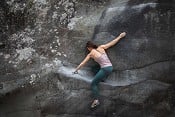
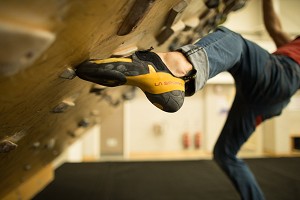
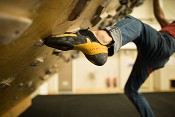








Comments